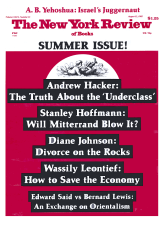To the Editors:
One is surprised to find that guilt of the successful attack on Pearl Harbour still being laid on Roosevelt or the Admirals rather than on the Intelligence Services, in particular the FBI (NYR, May 27]. Surely Sir John Masterman, the author of the report on the Double-Cross System published in 1972, had made that plain. He wrote about the despatch of the double-agent Tricycle to New York:
Tricycle’s questionnaire for America … contained a sombre but unregarded warning of the subsequent attack on Pearl Harbour. … Tricycle had established himself as a leading and highly placed agent in England … so much was he trusted that it was arranged that he should go to America (at the behest of the Germans) in order to start a large scale espionage network for them there. He accordingly left England on 26 June … and finally departed for America on 10 August, carrying with him his questionnaire concealed under a series of full stops. … It will be remembered that the full stops were photographed and enlarged by the FBI in America, who were therefore in possession of all the information contained in the questionnaire. … The whole questionnaire covers approximately three quarto sheets typed, and of this one-third deals with Hawaii and in particular with Pearl Harbour. … It is therefore surely a fair deduction that the questionnaire indicated very clearly that in the event of the United States being at war, Pearl Harbour would be the first point to be attacked, and that plans for this attack had reached an advanced state by August 1941. Obviously it was for the Americans to make their appreciation and to draw their deductions from the questionnaire rather than for us to do so. Nonetheless, with our fuller knowledge of the case and of the man, we ought to have stressed its importance more than we did. With the greater experience of a few more years’ work, we should certainly have risked a snub and pointed out to our friends in the United States what the significance of the document might be; but in 1941 we were still a little chary of expressing opinions and a little mistrustful of our own judgment.
Tricycle (Dusko Popov) has himself described in Spy Counter Spy (1974) his stormy encounter with Hoover, four months before Pearl Harbour, and Hoover’s wounded pride, his refusal to trust a “double-agent.” Popov writes of how he heard the news of Pearl Harbour. “I had the right information to forestall the attack. I had travelled thousands of miles to deliver the information, which would certainly have shortened the war by a year or more. American red tape stopped the information going through.”
Graham Greene
Antibes, France
This Issue
August 12, 1982



